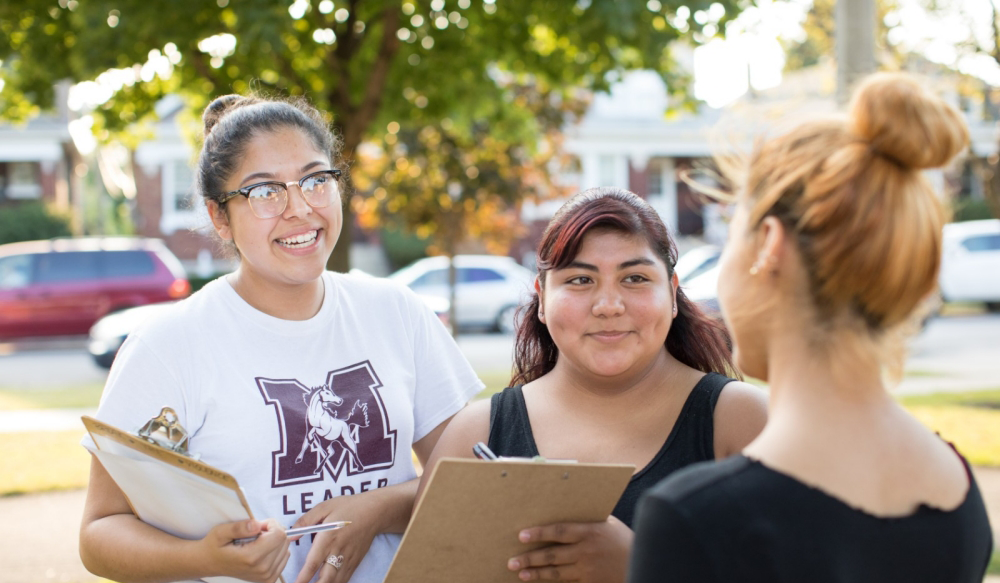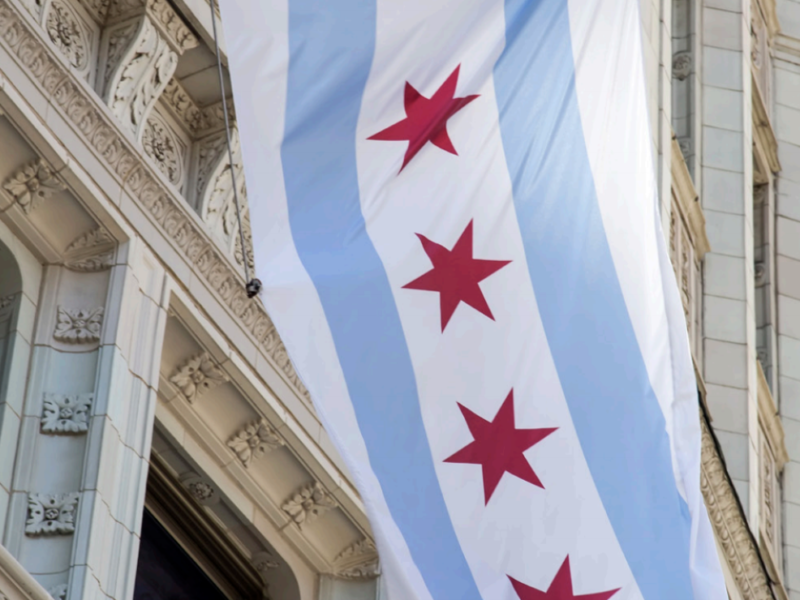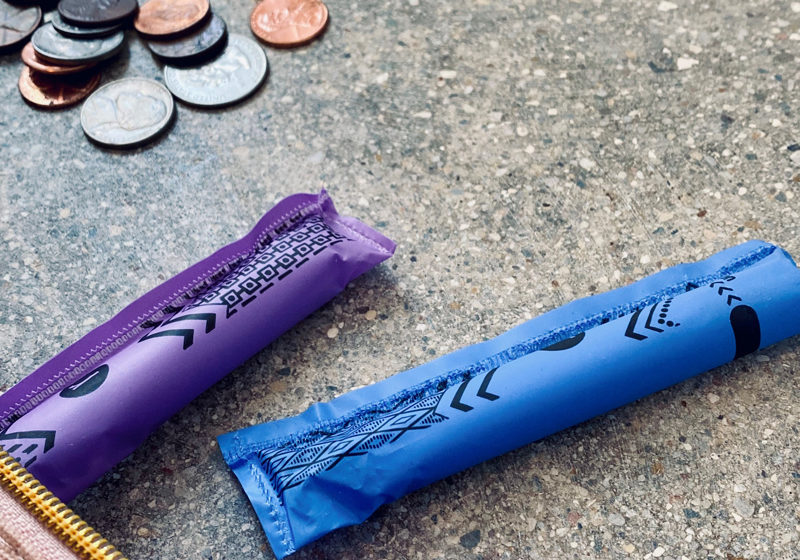
A New Day in Cicero: Robert Wood Johnson Foundation Recognizes Culture of Health in Suburb
Above: Bernice Cruz (center) and Jennifer Gaucin (left) are Health Ambassadors. As part of their role in helping with local events, they are seen here checking in Claudia Gonzalez (right) into the Corazon Community Services Break the Violence Event. Copyright 2018 Josh Kohanek. Photo courtesy of the Robert Wood Johnson Foundation.
At the turn of the century, Cicero was a community of 83,000 plagued for decades by violence, poverty, and disconnected youth. Then came the uprising.
With the inauguration in of the Cicero Community Collaborative more than 10 years ago, a grassroots movement took root across this six-square-mile suburb that once served as an industrial center just west of Chicago.
In a wild change of direction that many long-time Cicero residents never expected to witness, the small town is making an incredible comeback. In 2018, it was recognized by Chicago Ideas supporter Robert Wood Johnson Foundation with a Culture of Health Prize for the way it has tackled its most deeply seeded challenges, most significantly, making youth feel more connected to and responsible for the place they call home. The RWJF Culture of Health Prize honors and elevates communities working at the forefront of advancing health, opportunity, and equity for all.
We wanted to learn more about the ideas that are fueling a quiet revolution just outside the city (a place so close to Chicago that it has its very own stop on the Pink Line), so we connected with Joel Wallen, Youth Development Programs Director at Youth Crossroads, who sat down with Diana Solis, a sophomore at Morton East High School in Cicero, to talk about Cicero, youth, and what the Culture of Health Prize has done for the community.
Joel Wallen (JW): Cicero was awarded the Culture of Health Prize from the Robert Wood Johnson Foundation; what does a culture of health mean to you?
Diana Solis (DS): It could be implementing health based clinics in our school, or even something simple at the community center, like having health events, or just promoting healthier communities. Or it could be installing more choices in our community rather than just having commercial supermarkets. It could be mental health and talking more about mental health in schools and providing counseling to any student in the Cicero area, whether it be in school with the actual school counselors or other organizations. So I guess that would mean culture of health (it could go either way) either physical or mental health.
JW: That’s great. So what do you think, how can you and other people your age—you know, other teenagers—be able to be part of the impacts and make change happen in Cicero?
DS: I think of definitely bringing up what’s not here, and talking about it because everybody would acknowledge the fact that we might not have healthier options in terms of food. We need fresh foods provided to us, whether it be through a farmer’s market or something like that, which in a lot of other towns and other cities there might be. But we’ll talk about it, and then we won’t do anything about it. Actually move forward and talk to people who have the power to do change.
JW: A lot of what you are saying is about using youth voice, and making sure that youth voice is included in decision making. So what do you love most about living in Cicero?
DS: I think it’s definitely the culture. It’s predominately Latino and Hispanic culture, but there’s also the history of Cicero sometimes. It’s driving down Cermak and seeing Claude’s Restaurant and being reminded of other cultures. In a lot of other towns there’ll be more dominant cultures, but Cicero manages to include all cultures in a sense and make sure that there’s not exclusion. But people don’t easily forget about their culture. They’re reminded of it through parades or festivals.
JW: How do you inspire others your age to get involved in the community?
DS: A lot of people can be really busy when it comes to community service, because they don’t know where to start. I just tell people, do whatever you can, there’s opportunities everywhere, whether it’s jus helping out at the park or something as simple as the Cicero Clean-up Day. Help places that you actually like and you actually enjoy helping.
JW: Diana, I know you do a lot of volunteering with your peers. Can you give an example of some of the stuff that you’ve been involved in?
DS: I like working with kids, especially at Ronald McDonald House, because you get to have that personal level of communication with them and actually see them face to face. It inspires you to keep moving on or makes you want to volunteer more, just because you get that level of connection with people in the community. You know that you’re doing something good, just not for your benefit, but for the benefit of others.
JW: In five years, what’s your hope for Cicero?
DS: I think it is definitely talking more about certain issues that arise and that people are kind of quiet about because they fear that people are going to shut them down completely. I hope that the people of Cicero are making changes and that they’re not just ignoring the voices of teens especially. My own personal friends have partaken in opportunities to speak their voice, and a lot of times they’re shut down because they’re “just kids.” I hope we move towards more healthy communication between people who have the power and people who don’t necessarily have that much power, but could.
JW: I think you’re developing a theme of the importance of using youth voice, empowering youth voice, and hopefully in five years from now we can hope there’s more youth voice involved in Cicero and involved in moving Cicero towards an even healthier community. If there’s one thing that you could share about Cicero, what’s that one thing you’d want to share?
DS: I think noticing that we’re more than a statistic. When people talk about Cicero, they talk about how many kids dropout or things like this. A lot of people tend to bring in numbers when it comes to Cicero. We’re more than just a statistic; we’re an actual community that has a lot of people that care. There’s people who are trying to make changes here.
JW: I think that something we’ve seen with the Robert Wood Johnson Foundation Culture of Health Prize is a lot of the initiatives that are coming out in the community are fostering leadership opportunities for all. If there is one thing that you could tell the Chicago Ideas community about why youth are so important in community change, what would that be?
Diana Solis: I think when it comes to community change, youth are the ones who tend to notice it more because most of the time, they’re the one facing the issues in our community. As we progress more and realize how we have the power to change things, youth are doing that. You just don’t hear about youth in Cicero making changes, but I know for me personally, many of my friends have gone above and beyond before they leave for college to make sure that Cicero is what they want it to be. And honestly, it’s kind of heartbreaking for them to see the changes that are not happening before they leave, because it’s something that they’re so passionate about and that they want to happen. They pour their sweat and tears for it, and I think it’s really difficult not to see the changes happening. The youth care about what’s happening and we’re not just going to let anything happen.




